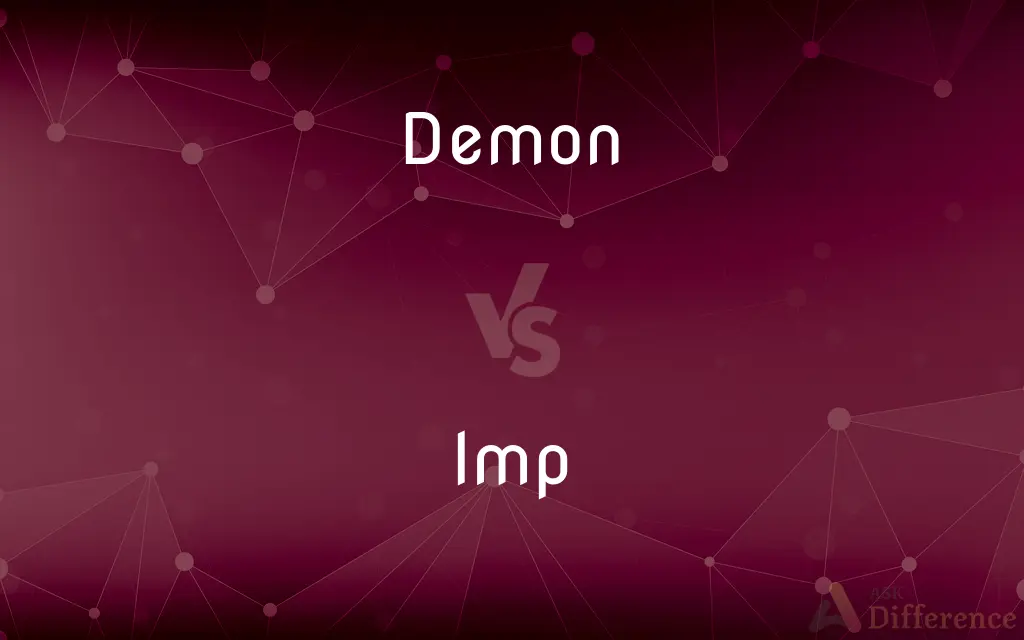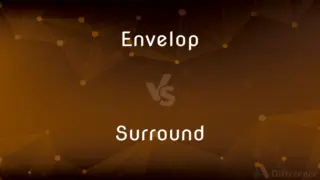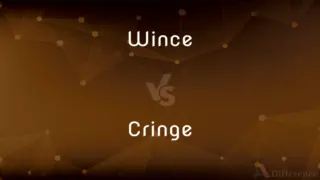Demon vs. Imp — What's the Difference?
By Maham Liaqat & Fiza Rafique — Updated on April 5, 2024
Demons are powerful, often malevolent supernatural beings in folklore and religious traditions, while imps are smaller, mischievous creatures considered to be lesser demons or supernatural beings.

Difference Between Demon and Imp
Table of Contents
ADVERTISEMENT
Key Differences
Demons, as depicted in various cultures and religious texts, are often portrayed as malevolent supernatural beings with considerable power and influence over humans and the natural world. They are associated with evil, corruption, and the temptation of humans, capable of possessing individuals and wielding dark powers. In contrast, imps are typically portrayed as smaller, less powerful entities, often considered to be lesser demons. They embody mischief rather than outright malevolence, more likely to play annoying pranks or serve greater demons than to cause serious harm directly.
In terms of hierarchy within supernatural folklore, demons often hold positions of significant power, sometimes organized into complex hierarchies with distinct roles and responsibilities in the underworld or demonic realms. They are frequently depicted as challenging gods, angels, or humans in various mythologies. Imps, however, are usually seen as low-ranking members of the supernatural world, lacking the authority or power of their larger counterparts. Their role is more akin to that of troublemakers or servants to more powerful demons, reflecting their lesser status.
Regarding their representation in literature and media, demons are usually main antagonists or significant figures in stories, symbolizing major threats or evil forces that heroes must overcome. Their depiction emphasizes fear, respect, and the struggle between good and evil. On the other hand, imps are often used for comic relief or as minor characters in stories, their antics serving to annoy or distract rather than to present a genuine threat. This difference highlights the distinct narrative roles these beings play based on their perceived nature and power.
When it comes to abilities and attributes, demons are often endowed with supernatural powers, including shape-shifting, mind control, and other formidable magical abilities. They may also be depicted as invulnerable to conventional weapons, requiring special means or knowledge to be defeated or contained. Conversely, imps, while also supernatural, have abilities that are more limited in scope and impact, such as playing tricks on people or performing simple magical tasks. Their powers are rarely destructive on a large scale, aligning with their role as lesser beings within the realm of the supernatural.
The cultural and religious significance of demons is profound, with many traditions featuring rituals, symbols, or practices aimed at protecting against demonic influence or possession. Demons often serve as symbols of human vice, temptation, and the internal struggle against evil. Imps, with their less intimidating presence, do not carry the same weight of religious or moral symbolism. They are more often found in folk tales and fantasy genres, embodying the idea that not all supernatural beings are inherently evil but can cause trouble or chaos in more benign ways.
ADVERTISEMENT
Comparison Chart
Nature
Malevolent and powerful supernatural beings.
Lesser, mischievous creatures considered minor demons.
Hierarchy
Often hold significant power and rank in supernatural hierarchies.
Low-ranking, without notable power or authority.
Role in Stories
Main antagonists or significant evil figures.
Comic relief, minor nuisances, or servants to greater demons.
Abilities
Possess formidable supernatural powers and resistances.
Have limited magical abilities, focusing on mischief.
Cultural Significance
Symbolize evil, temptation, and are feared.
Seen as troublesome but not deeply evil; less culturally profound.
Compare with Definitions
Demon
Carry significant religious and moral symbolism, often associated with the ultimate embodiment of evil.
In many cultures, demons are seen as the embodiment of human vice and the eternal adversaries of good.
Imp
Serve as minor characters or comic relief, causing trouble more than terror.
The imp’s playful interference in the hero’s journey added a light-hearted twist to the tale.
Demon
Demons are often depicted as powerful and malevolent entities in religious and mythological traditions, capable of influencing or possessing humans.
The ancient texts describe demons tempting humans away from the path of righteousness.
Imp
While part of supernatural folklore, imps are not usually associated with deep moral or religious implications.
Folk tales often feature imps as playful spirits, warning of the chaos that mischief can cause.
Demon
Often serve as major antagonists embodying evil or corruption.
In the story, the hero battles a demon that has unleashed chaos upon the land.
Imp
Considered low-ranking within the supernatural realm, lacking the power and authority of greater demons.
In the demonic realm, imps serve at the whims of their more powerful masters, performing menial tasks.
Demon
Demons are frequently assigned ranks and roles within complex supernatural hierarchies.
In many traditions, demons are organized into hierarchies, with some tasked with tempting humans and others with punishing the damned.
Imp
Have limited magical abilities, often used for trickery rather than harm.
The imp used its magic to make small objects disappear, leading to playful but harmless confusion.
Demon
Possess a wide range of supernatural powers, including possession, shape-shifting, and casting curses.
The demon used its power to possess the king, leading the kingdom into a dark era.
Imp
Imps are depicted as smaller, mischievous beings in folklore, often considered lesser demons with a penchant for pranks.
The imp amused itself by hiding the villager’s belongings and watching the ensuing confusion.
Demon
A demon is a supernatural being, typically associated with evil, prevalent historically in religion, occultism, literature, fiction, mythology, and folklore; as well as in media such as comics, video games, movies, anime, and television series. In Ancient Near Eastern religions and in the Abrahamic traditions, including ancient and medieval Christian demonology, a demon is considered a harmful spiritual entity which may cause demonic possession, calling for an exorcism.
Imp
An imp is a European mythological being similar to a fairy or demon, frequently described in folklore and superstition. The word may perhaps derive from the term ympe, used to denote a young grafted tree.
Demon
An evil supernatural being; a devil.
Imp
A mischievous child.
Demon
A persistently tormenting person, force, or passion
The demon of drug addiction.
Imp
A small demon.
Demon
One who is extremely zealous, skillful, or diligent
Worked away like a demon.
A real demon at math.
Imp
(Obsolete) A graft.
Demon
Variant of daimon.
Imp
To graft (new feathers) onto the wing of a trained falcon or hawk to repair damage or increase flying capacity.
Demon
An evil supernatural spirit.
Imp
To furnish with wings.
Demon
An evil spirit resident in or working for Hell; a devil.
Imp
(obsolete) To engraft or plant (a plant or part of one, a sapling, etc.).
Demon
A false god or idol; a Satanic divinity.
Imp
To graft or implant (something other than a plant); to fix or set (something) in.
Demon
A very wicked or malevolent person; also in weakened sense a mischievous person, especially a child.
Imp
To engraft (a feather) on to a broken feather in a bird's wing or tail to repair it; to engraft (feathers) on to a bird, or a bird's wing or tail.
Demon
A source (especially personified) of great evil or wickedness; a destructive feeling or character flaw.
The demon of stupidity haunts me whenever I open my mouth.
Imp
(by extension)
Demon
(in plural) A person's fears or anxieties.
Imp
To provide (someone or something) with wings, hence enabling them or it to soar.
Demon
A neutral supernatural spirit.
Imp
To add to or unite a object with (something) to lengthen the latter out or repair it; to eke out, enlarge, strengthen.
Demon
A person's inner spirit or genius; a guiding or creative impulse.
Imp
A small, mischievous sprite or a malevolent supernatural creature, somewhat comparable to a demon but smaller and less powerful, formerly regarded as the child of the devil or a demon (see sense 3.2).
Demon
(Greek mythology) A tutelary deity or spirit intermediate between the major Olympian gods and mankind, especially a deified hero or the entity which supposedly guided Socrates, telling him what not to do.
Imp
(by extension)
Demon
A spirit not considered to be inherently evil; a (non-Christian) deity or supernatural being.
Imp
A mischievous child.
Demon
A hypothetical entity with special abilities postulated for the sake of a thought experiment in philosophy or physics.
Imp
A baby Tasmanian devil.
Demon
Someone with great strength, passion or skill for a particular activity, pursuit etc.; an enthusiast.
He’s a demon at the card tables.
Imp
(obsolete)
Demon
(card games) A type of patience or solitaire (card game) played in the UK and/or US.
Imp
A young shoot of a plant, a tree, etc.; a sapling; also, a part of a plant used for grafting; a graft.
Demon
Any of various hesperiid butterflies of the genera Notocrypta and Udaspes.
Imp
An offspring or scion, especially of a noble family; (generally) a (usually male) child; a (young) man.
Demon
A spirit, or immaterial being, holding a middle place between men and deities in pagan mythology.
The demon kind is of an intermediate nature between the divine and the human.
Imp
Something added to or united with another to lengthen it out or repair it (such as an eke or small stand on which a beehive is placed, or a length of twisted hair in a fishing line).
Demon
One's genius; a tutelary spirit or internal voice; as, the demon of Socrates.
Imp
A shoot; a scion; a bud; a slip; a graft.
Demon
An evil spirit; a devil.
That same demon that hath gulled thee thus.
Imp
An offspring; progeny; child; scion.
The tender imp was weaned.
Demon
One of the evil spirits of traditional Jewish and Christian belief
Imp
A young or inferior devil; a little, malignant spirit; a puny demon; a contemptible evil worker.
To mingle in the clamorous frayOf squabbling imps.
Demon
A cruel wicked and inhuman person
Imp
Something added to, or united with, another, to lengthen it out or repair it, - as, an addition to a beehive; a feather inserted in a broken wing of a bird; a length of twisted hair in a fishing line.
Demon
Someone extremely diligent or skillful;
He worked like a demon to finish the job on time
She's a demon at math
Imp
To graft; to insert as a scion.
Imp
To graft with new feathers, as a wing; to splice a broken feather.
Imp out our drooping country's broken wing.
Who lazily imp their wings with other men's plumes.
Here no frail Muse shall imp her crippled wing.
Help, ye tart satirists, to imp my rageWith all the scorpions that should whip this age.
Imp
(folklore) fairies that are somewhat mischievous
Imp
One who is playfully mischievous
Common Curiosities
What is an imp in folklore?
An imp is a lesser, mischievous supernatural being, often considered a minor demon, known for playing pranks.
Can imps be considered evil?
While imps are mischievous, they are not typically considered evil in the same manner as demons; their actions are more annoying than harmful.
What defines a demon?
A demon is a malevolent supernatural entity known for its power to corrupt, possess, or harm humans.
Are imps always subordinate to demons?
In many stories and folklore, imps are depicted as serving under more powerful demons, acting as servants or messengers.
How do demons and imps differ in power?
Demons possess significant supernatural powers and are often invulnerable to human weapons, whereas imps have much more limited abilities, focusing on mischief.
What role do demons play in religious texts?
Demons often embody temptation, evil, and opposition to divine forces in religious texts, serving as tests of faith or agents of punishment.
Can a demon ever be portrayed positively?
While traditionally seen as malevolent, some modern interpretations and stories may portray demons in a more nuanced or sympathetic light.
Do imps have a specific appearance?
Imps are often depicted as small and mischievous, sometimes with horns or tails, but their appearance can vary widely across different stories.
How are imps typically used in literature?
Imps often appear in literature as playful or annoying characters, providing comic relief or minor obstacles to protagonists.
What are some common abilities of demons?
Demons are often attributed with shape-shifting, mind control, superhuman strength, and the ability to invoke fear or madness.
Share Your Discovery

Previous Comparison
Envelop vs. Surround
Next Comparison
Wince vs. CringeAuthor Spotlight
Written by
Maham LiaqatCo-written by
Fiza RafiqueFiza Rafique is a skilled content writer at AskDifference.com, where she meticulously refines and enhances written pieces. Drawing from her vast editorial expertise, Fiza ensures clarity, accuracy, and precision in every article. Passionate about language, she continually seeks to elevate the quality of content for readers worldwide.














































